30 Simple Ways to Prevent a Heart Attack Before it Strikes
Extend your life by years by following these expert tips.

You’ve heard of dying of a broken heart. But did you know you could break your own? Years of wrong decisions can take their toll, but you can take action to seriously reduce your risk of heart problems. Studies show that about 80% of heart disease is preventable. Newsful asked experts to tell us which habits can ensure you’ll remain a healthy-heart statistic. Here’s what they told us.
1
Eat Dark Chocolate

“A number of studies have demonstrated that consuming dark chocolate can improve a number of risk factors for heart disease,” says Jamie Bacharach, a licensed medical acupuncturist and head of practice with Acupuncture Jerusalem. “This includes lowering levels of oxidized LDL which is directly linked to the development of heart disease. This is thanks in large part to the antioxidant content in dark chocolate. Dark chocolate has also been found to reduce insulin resistance, another prominent risk factor for heart disease.”
2
Mix Things Up

“Try different fitness modalities to not only keep you intrigued and motivated, but also to challenge your body and avoid plateauing,” says Maria M. Guerra, certified personal trainer and American Heart Association’s Go Red for Women national volunteer.
Newsful Rx: “The American Heart Association recommends 150 minutes per week of moderate-intensity aerobic activity or 75 minutes per week of vigorous aerobic activity, preferably a combination of both, as well as two days of strength training,” says Guerra.
3
Sit Less
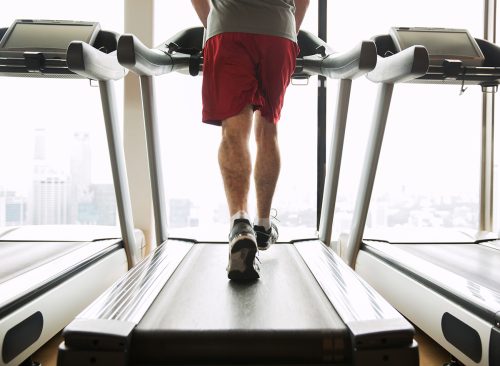
“Cardiovascular health and strength is diminished by sedentary behavior and strengthened by exercise and activity,” says Bacharach. “There is a direct link between exercise and improved heart health. But in truth, just reducing sedentary time can go a long way toward strengthening the heart.”
Newsful Rx: “Walking on a treadmill while watching TV or working at a standing desk rather than sitting for hours on end are two examples of simple lifestyle changes which can contribute to a stronger, healthier heart,” she says.
4
Do This Much Cardio

“Regular exercise will help make the heart stronger and more efficient,” says Sanjiv Patel, MD, cardiologist at MemorialCare Heart & Vascular Institute at Orange Coast Medical Center in
Fountain Valley, California. “It will help lower stress, improve sleeping, lead to a healthier body weight, and improve muscle tone and strength. Overall, exercise will help reduce the chance of getting other diseases like high blood pressure and diabetes that increases the risk of stroke and heart attack.”
Newsful Rx: “It is important to keep doing aerobic exercises like jogging, running, fast walking, swimming or biking for at least 30 minutes a day regularly,” says Patel.
5
Do Strength Training

“Resistance exercises (weightlifting) are often overlooked as a heart-healthy exercise,” says John Martinez, MD, a primary care and sports medicine physician in Davis, California. “Multiple studies show that regular resistance training can lower blood pressure, improve the relaxation of the lining of the arterial walls, improve heart wall strength and contractility. More importantly, regular resistance training has been shown to significantly decrease all CVD (cardiovascular disease) events between 40 to 70% compared to those that did not engage in regular resistance exercise.”
Newsful Rx: “This benefit in diminishing risk of heart disease was seen in patients that did resistance training from one to three times a week,” says Martinez.
6
Eat Blueberries Daily

“One tip I give for heart health is to eat a cup of blueberries every day,” says Lauren Manaker MS, RDN, LD, a registered dietitian in Charleston, South Carolina. “A growing body of scientific evidence demonstrates that blueberries can be part of eating patterns to improve cardiovascular health, especially as part of an overall healthy lifestyle.” A study recently published in the American Journal of Clinical Nutrition found that people with metabolic syndrome may improve their heart health by consuming one daily serving of blueberries.
Newsful Rx: Eat blueberries right from the container, add them to salad, or make them part of a post-workout smoothie.
7
Eat Salmon Twice a Week
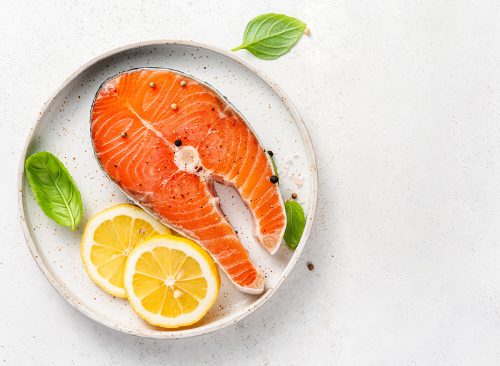
“Salmon is packed with important nutrients, such as omega-3 fatty acids, which can help with circulation and reduce the risk of heart disease,” says Rima Kleiner, MS, RD, a registered dietitian in Greensboro, North Carolina. “According to the American Heart Association, a healthy diet and lifestyle are your best weapons in the fight against heart disease, with a specific emphasis on seafood.”
Newsful Rx: “Eating oily fish that contains omega-3 fatty acids, like salmon, at least twice a week may help lower your risk of coronary artery disease,” says Kleiner.
8
Eat More Fruits and Vegetables

“Phytonutrient-rich foods will fuel the body with antioxidants that will reduce free radicals which cause damage to the cells as they work to strengthen your heart,” says Rachel Fine, MS, RD, CSSD, CDN, a registered dietitian nutritionist in New York City. “Fruits and vegetables are loaded with these beneficial plant compounds. Eating a serving or more of fruits and vegetables at each meal and as snacks will ensure you are getting enough phytonutrients for strength.”
Newsful Rx: At every meal, aim to fill half your plate with fruits and vegetables.
9
Eat Healthy Fats and Lean Protein
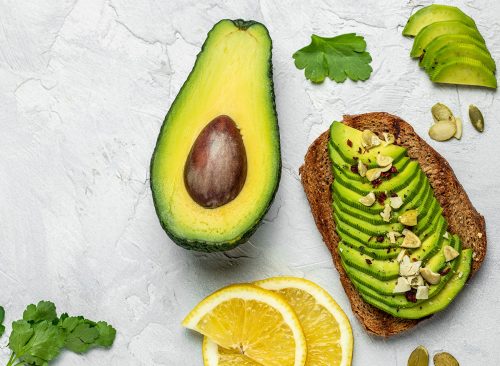
“Protein is as, if not more, important when it comes to strengthening your heart,” says Fine. Fatty fish and healthy fat food sources, like avocados and chia seeds, will give your heart and body healthy lean protein to build and strengthen your heart muscle.”
Newsful Rx: Aim to consume 0.8 grams of protein per kilogram of body weight each day; get it from lean protein sources such as skinless chicken, salmon and beans. Like fish, chia seeds are a good source of heart-healthy omega-3 fatty acids.
10
Drink Moderately

You know that drinking too much can lead to liver problems. But it can also damage your heart, leading to cardiomyopathy, a condition in which the heart becomes enlarged and weakened. This increases the risk of heart attack and cardiac arrest.
Newsful Rx: For heart health and to lower your risk of cancer, experts say men should limit themselves to two alcoholic drinks a day, and women should have no more than one.
11
Keep Your Cholesterol Down
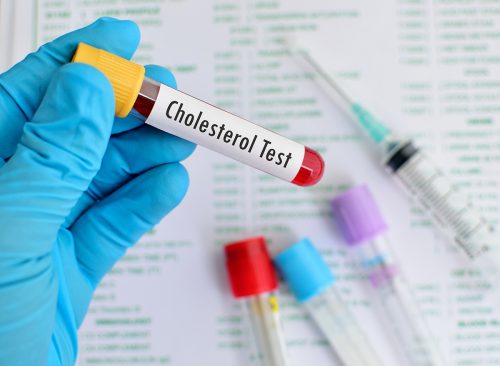
As we age, the body produces more cholesterol, which can build up in the arteries, increasing the risk of heart disease and stroke. Experts recommend a cholesterol check every five years, but older adults may need it done more often.
Newsful Rx: Your total cholesterol level should be less than 200 milligrams per deciliter (mg/dL), with an LDL level of less than 100 mg/dL and an HDL level of 60 mg/dL or higher.
12
Keep Your Blood Pressure Down

High blood pressure, or hypertension, is the second most common cause of death from preventable heart disease and strokes—second only to smoking.
Newsful Rx: See your healthcare provider to have your blood pressure tested regularly; follow their recommendations about lifestyle changes and/or medication to keep your numbers in a healthy range.
13
Challenge Yourself Outside the Gym

“Your heart is a muscle, and just like any other muscle, it can be strengthened,” says Alysa Boan, an NASM-certified personal trainer at FitnessTrainer.com. “Cardiovascular activity is a well known way to strengthen the heart and improve health. It doesn’t mean you have to go on a 10-mile run. Sometimes even a brisk walk is enough.”
Newsful Rx: “Any activity that increases your heart rate significantly and for an extended period of time counts,” says Boan. “That could mean going for a swim, taking the stairs instead of the elevator, or even yard work. If you struggle to get regular activity in, focus less on getting to the gym and more on incorporating regular movement into your day to feel good.”
14
Avoid Simple Carbs and Added Sugar

“It is important to avoid inflammatory foods while trying to boost your heart’s strength,” says Fine. “Excess refined carbohydrates and sugar can exacerbate inflammation and weaken your heart muscle.”
Newsful Rx: Focus your diet on whole foods. Limit processed foods and those with added sugar. When buying packaged products, choose those with as few ingredients (and as little added sugar as possible.
15
Reduce Sodium

A diet high in sodium is a major risk factor for high blood pressure, which can weaken the heart.
Newsful Rx: The American Heart Association recommends keeping sodium consumption to 2,300mg (about one teaspoon of salt) per day. Most Americans consume 3,400mg daily. Don’t salt your food, and check nutrition labels; choose products that are low in sodium.
16
Eat More Fiber

“If you’re not a vegetable eater, supplementing your daily fiber needs is important,” says Nicolle Harwood-Nash, a certified personal trainer and fitness coach with The Workout Digest. “In addition to preventing constipation, fiber is important to maintaining gut flora. Microbes in our gut eat fiber. Without enough fiber, they starve and ‘bad’ species of microbes can take over. These microbes can end up feeding on the lining of the gut. Imbalanced gut flora is linked to heart disease.”
Newsful Rx: Fruits and vegetables are high in fiber; to get enough, follow the Dietary Guidelines for Americans recommendations: 1 ½ to 2 cups of fruit per day, and 2 to 3 cups of vegetables.
17
Eat Mediterranean

Experts say the Mediterranean diet is excellent for heart health. It emphasizes fruits and vegetables, healthy fats such as avocado and olive oil, and lean protein such as salmon.
Newsful Rx: Ask your healthcare provider if an eating plan like the Mediterranean diet is right for you.
18
Lose Weight

Being overweight or obese is a major risk factor for heart disease. It tends to be associated with other conditions—including high blood cholesterol, high blood pressure, and diabetes—that weaken the heart.
Newsful Rx: According to the National Institutes of Health, losing just 5 to 10 percent of your body weight can strengthen your heart and reduce your risk of developing heart disease.
19
Don’t Smoke

Tobacco smoke contains more than 7,000 toxins. When inhaled, they damage arteries and weaken the heart. “Stop smoking, as it will single-handedly reduce the risk of heart attack and stroke by 40 to 50%,” says Patel.
Newsful Rx: If you use tobacco, see your doctor about strategies that can help you quit. If you don’t smoke, don’t start.
20
Advocate For Yourself

“I encourage women to advocate for themselves and ‘live from the heart’ by paying attention to heart health and overall wellness,” says Suzanne Steinbaum, D.O., preventive cardiologist in New York and American Heart Association’s Go Red For Women volunteer expert. “Heart disease is no longer just a problem for older women or men—heart attacks are on the rise in young women. The good news is up to 80% of cardiac events can be prevented. Even modest changes to diet and lifestyle can help lower your risk.”
Newsful Rx: “Women should speak with their doctors and make living a healthy lifestyle a priority by moving more, eating smart and managing blood pressure,” says Steinbaum. “The American Heart Association’s Go Red for Women website has great resources and tips to empower women to take charge of their heart health.”
21
Get Quality Sleep

Poor sleep can affect your cardiovascular health. Sleep is when the body repairs itself, including the heart. According to a study done by the CDC, people who slept less than 7 hours a night reported having more heart attacks—along with obesity, Type 2 diabetes and high blood pressure, conditions that lead to heart disease.
Newsful Rx: Experts, including the American Sleep Foundation, recommend that adults get seven to nine hours of sleep a night.
22
Keep Your Teeth and Gums Healthy

In medical circles, there is growing suspicion that periodontal (gum) disease is associated with coronary heart disease, according to Harvard Medical School. Harmful bacteria in your mouth might cause inflammation throughout the body that weakens the heart.
Newsful Rx: Practice good oral hygiene and visit the dentist twice a year.
23
Don’t Oversleep

Research published in the Journal of the American Heart Association found that getting more than eight hours of sleep can increase your risk of heart disease. An average of nine hours came with a moderate risk, and 11 hours was associated with a nearly 44 percent increase.
Newsful Rx: Get seven to nine hours—no more, no less.
24
Build Exercise Endurance

“Exercise is critical to heart health. Being able to push yourself and gauge how this affects you makes dialing into symptoms of coronary artery disease easier,” says Nicole Weinberg, MD, a cardiologist at Providence Saint John’s Health Center in Santa Monica, California. “For example, if you normally run a mile without any symptoms, but now you can’t run past one city block, you need to see your doctor.”
Newsful Rx: “Symptoms of coronary artery disease are not always chest pain or shortness of breath, so that’s why using your regular exercise as a barometer is key.”
25
Get Your Annual Physical

“Patients who check in with their doctor will be able to have their risk factors of coronary artery disease assessed,” says Weinberg. “You will have an EKG, blood pressure check and fasting cholesterol checked. If these are assessed at least once a year, there are fewer surprises.”
Newsful Rx: Pick up the phone and schedule that annual physical.
26
Take the Stairs

“It’s no surprise that the number of heart attacks greatly increased after the introduction of the elevator,” says Richard Wright, MD, cardiologist at Providence Saint John’s Health Center in Santa Monica, California. “Take the stairs at every opportunity.”
27
Cook at Home

“Above all, try to make your own food so that you can control what you eat and what goes in it,” says Patel.
28
Mind Your Mental Health

Depression is associated with higher risk of heart attack. Why? Feelings of sadness and isolation tax the heart, just like anxiety or stress.
Newsful Rx: If you’re feeling socially isolated or depressed, talk with your healthcare provider about the best course of action.
29
Get Vitamin K
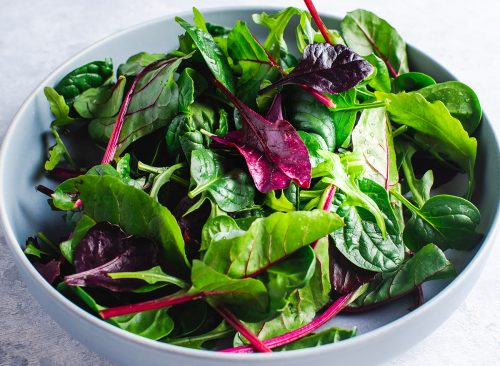
“Vitamin K is mostly found in leafy greens. Without vitamin K2, calcium would harden in our arteries, leading to heart disease,” says Harwood-Nash.This explains why a massive study published in the British Journal of Medicine found that taking calcium supplements increased the risk of heart attack or stroke by 20 to 30 percent.”
Newsful Rx: Foods high in Vitamin K include brussels sprouts, broccoli, spinach, collard greens and kale.
30
Move More at Work

“If you have an office job, consider walking while you work,” says Harwood-Nash. “Take a meeting on your phone so that you can go for a brisk walk while you chat. You can even propose conducting in-person walking meetings.”
Newsful provides the latest updates from leading experts, new research, and health agencies. However, our content should not replace professional medical advice. For specific questions regarding your medication or health, always consult your healthcare provider.














